I really didn’t want to watch Moana. After Brave completely corrupted the Disney princess narrative, and Frozen brutally murdered the trope of Prince Charming I had pretty much given up hope that I could even sit through another new Disney princess movie without banging my head repeatedly against the wall until it bled. But, when it came time to write Saving Cinderella, I felt I had to watch Moana in order to decide if it ought to be included in the book. So I watched it. And . . . well . . . I didn’t hate it.
After Disney’s brief foray back into the traditional princess narrative (with The Princess and the Frog in 2009 and Tangled in 2010), the studio suddenly veered wildly into camp feminist. With Brave (2012) and Frozen (2013), Disney was intentionally and overtly pushing a very specific message: men are dumb, who needs them?
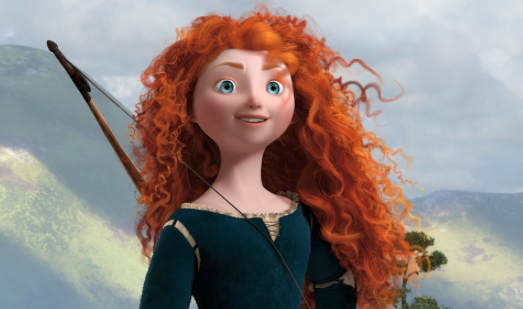
Brave director and creator Brenda Chapman specifically designed Merida to be “not just a simpering pretty face waiting around for romance!” In fact, she was “created to turn that whole ideal on it’s head!” Robert Lopez, one half of the husband and wife songwriting duo who wrote the songs for Frozen said that “the ending has always been about, no — it’s not a man’s love, it’s the love between these sisters, it’s family love,” that’s important. So, when I heard that Moana has no love interest at all, I was initially certain she was another feminist manifesto walking around pretending to be a Disney princess. I was right . . . and also wrong.
The thing that makes Moana bearable is that it isn’t actually a princess narrative. As I explain more fully in my book, the narrative of a fairy tale princess has a specific arc. It’s about a girl’s transition to womanhood, and expresses an internal (rather than external) transformation. It’s about the girl’s ability to break away from her childhood (usually represented by some kind of clingy mother figure) into her womanhood (usually represented by her connection to a man of worth, because the man symbolizes that the woman’s body is now ready to bear children). The princess becomes her truest self by separating from her parents and coming into her womanhood. Moana is not that story. Instead, it’s the hero’s journey.
The hero’s journey is a narrative category that encompasses stories in which a hero goes out on a journey, overcomes an obstacle, and returns changed. This arc was popularized by Joseph Campbell in his book, The Hero With A Thousand Faces. Campbell lays out the journey in seventeen stages that fall within the three acts of “departure,” “initiation,” and “return.”
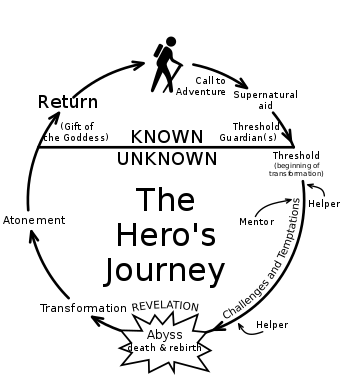
Traditionally, the hero’s journey is a masculine storyline. Which makes sense. Men are more inclined toward action, adventure, and getting things done, while women are more inclined toward relationships, emotions, and nurturing others.
The princess narrative is essentially the female equivalent of the hero’s journey. In both stories, the protagonist sets out on a quest to become his/her truest self and emerges changed. So, the fact that Moana is a hero’s journey with a female protagonist is, on the surface, strange.
But, it’s pretty clear that that’s exactly what it is. And, given the fact that it hits nearly all of Campbell’s stages, it’s fairly obvious that the filmmakers knew what they were doing. From Moana’s “call to adventure” (“See the line where the sky meets the sea? It calls me!”), to her “supernatural aid” from the anthropomorphized ocean, to her “road of trials,” to her “ultimate boon” of returning the heart of Te Fiti, and finally her “freedom to live” which allows her to return to her island but still explore the sea, the story fits the hero’s journey exactly.
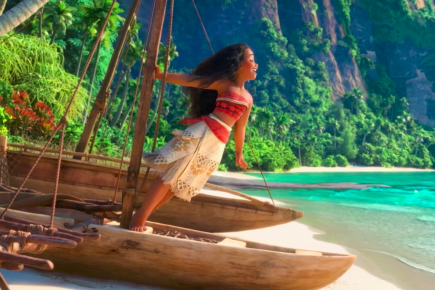
So, what should we make of this traditional masculine narrative being undertaken by a woman? On the one hand, creating a story in which a woman undertakes the hero’s journey allows the filmmakers to create a female protagonist whose narrative has nothing to do with love.
In Brave, Merida had to actively reject her suitors, because her narrative was — ostensibly — a princess narrative. And in Frozen, the handsome prince character, Hans, had to jarringly be revealed to be a murderous psychopath in order to prove Disney’s new thesis that men are dumb, who needs them? But completely shifting the narrative away from the princess arc allows the story to do away with a love interest entirely without needing to make any kind of statement whatsoever. And, given the fact that the movie doesn’t have Moana performing physical feats that she couldn’t possibly accomplish, or swaggering around actively swearing off men, the whole thing is a lot less offensive to those of us who think the princess narrative is a good thing.
On the other hand, the relationship between Moana and the demigod Maui is so clearly the prince/princess relationship that one has to wonder why they didn’t just have them get together in the end. And the only conclusion one can come to on that front is that it would go against the men are dumb, who needs them? thesis, which is a disappointment.
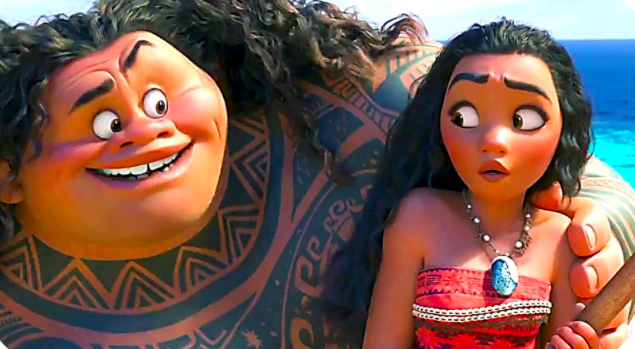
Aside from the men are dumb, who needs them? movies, Disney has two romantic plot lines when it comes to princess movies. You’ve got the Snow White/Cinderella plot line — where a princess and a handsome prince fall in love at first sight, and you’ve got the Beauty and the Beast plot line (played out slightly differently in films like Aladdin and Tangled) where a prince and a princess get to know each other and ultimately transform each other. Moana and Maui represent that second version.
Just like the Beast, or Aladdin, or Flynn Ryder, Maui is initially a cocky, arrogant guy who sees the girl as his ticket out of the life he’s living. But, through Moana’s insistence on sticking to her morals and maintaining her values, he comes to see that there is more to life than he originally thought. But, instead of having them fall in love and find themselves better for it, the two part ways at the end for . . . no apparent reason.
It’s clear that Moana represents a possible avenue for the future of Disney heroines. Instead of making movies that are actively about getting rid of all men, the studio could abandon the princess narrative altogether, creating movies where female protagonists grow up without the symbolic union with a man.
I’m not categorically opposed to this. One potential positive that could come out of it would be the return to more feminine female leads. For all her jumping onto ships and sailing around Moana is very feminine. In fact, in her final “showdown” with Te Ka she wields her compassion (not a sword) to restore the lava monster to her true benevolent form. She does not shy away from her emotions and maintains her strong moral core throughout. That’s a refreshing change from characters like Merida who seems to have no moral core, or Mulan who has to be able to compete with the men in order to prove her worth.
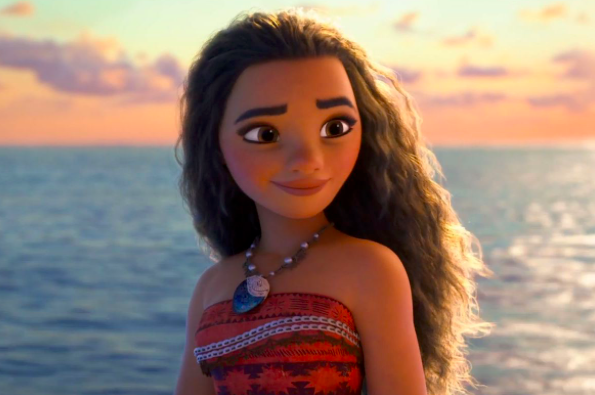
But I do confess that the loss of the love story makes me sad. What woman (or man for that matter) doesn’t want to find love? Even the hero, in the hero’s journey, often finds love. Why remove it entirely? These epic narratives tend to be about a young person finding his/her purpose in life and living it out. Surely a full and complete life includes a partner to share it with! At the end of this kind of story we want to know that our main characters are going to be okay in all areas of their lives. If they don’t find love, are we really content to leave them at the end of the film? I know I’m not!
It remains to be seen what Disney will do next with its female protagonists. Will they return to the man-bashing films of the post-Tangled era? Or will they venture forth into new storylines like they did with Moana? Or (and this is my hope) will they find a way to reinsert love into the new narrative so we can have feminine heroines and masculine heroes again in a brave new world of Disney princesses. Only time will tell.
Another great post Faith. I really enjoy a good romance subplot in a story. I think most stories are incomplete without it.
I also never really thought about Moana being a hero’s journey. I enjoyed the movie but it really clicks now that I know what it was. Pointing out how she accomplishes the journey in a feminine way really makes it work. In the end I really think it’s a matter of blending two things to make it interesting rather than the popular move of turning something on its head for the sake of doing it.
LikeLiked by 3 people
Agreed!
LikeLike
I enjoyed Moana but it was nothing special. The only thing that kind of got my hackles up was the in yer face ethnicity. I watch and enjoy Chinese Hong Kong films and Japanese monster movies and anime and somehow the ethnicity never occurs to me. Probably because these are movies created by those cultures for those cultures and it’s just a given. Moana, OTOH was a particular celebration of Polynesian culture by western multiculturalists and so was a kind of patronizing travelogue of a near perfect but fictional culture.
LikeLike
Interesting point.
LikeLiked by 1 person
Thank you Faith. I found the movie entertaining and the anti-masculine message is muted enough for me to allow it in ‘approved’ movie rotation (Frozen & Brave are banned).
I think a love story between Moana and Maui would have been a bad decision. Maui is a composite of different Polynesian mythologies of Maui. In some traditions Maui’s wife is part of the narrative; none of them call her Moana. Personally, I feel it’s very important to be careful and respectful with the basics of a mythologies.(Marvel’s altering to make Loki & Thor blood brothers is a long running pet peeve made worse by the popularity of the movies).
But, I think a third character (male ally) with a hint to a future love may have fixed some of the problems in the film. The film still maintains a pro-feminine theme and symbolism. I appreciate and agree with your points that this film has improvements where it embraces the feminine.
The film remains obviously influenced by the modern, anti-masculine feminists. So the film’s symbolism is filled with anti-male sentiments. The creation story lacks a masculine. The demi-god Maui is shown as the cause of problems and all the barriers to salvation are males.
As Faith points out, historically men have risked going out into the unknown – so the lack of adventure by her not-so-heroic father – fell flat for me. The idiotic rooster, which has no purpose in the film to me other than more poking at the masculine. The part that really made me shake my head and think ‘enough’ was the ending of the film and Moana breaking the tradition; it makes no sense given the story arc.
I’ve gone on long enough and getting a bit scattered in thoughts. Why did I like and approve of the film; the story could have been a lot better. The music is good and much like Faith pointed out in Tiana’s debate about race not being in the stories narrative, Moana takes no active part in the male slights (other than the ending).
More important, what does the young princess of our castle think. She likes Moana’s heroic bravery and the comedy of Maui; but she prefers Kiki Delivery Service, Ponyo, and Arrietty when given the options.
LikeLike
Well, the Moana character was shown as a little young to be involved in male-female romance activities. It might make a good followup story, but the lack of romance was fine. Her mentor was hands-off about romance, which made a GOOD mentor-mentee relationship – he treated her like a little sister who was a pest.
LikeLike
Faith,
Thanks for your take about Moana. While I enjoyed Moana, I found it flat precisely because it was Maui’s movie not Moana’s due to the hero’s journey.
If you take a closer look at the movie, the movie revolves around Maui’s redemption as the mischevious demi god who steals the gem heart from the diety. Moana spends so much of the movie as the sidekick who helps Maui become the hero.
As you cogently remark in your book, the feminine hero’s journey is the princess trope.That’s pretty much missing
So I found the movie good but disbalanced.
Brave is disordered because the ideology pushed the princess trope aside for….?
What bugged me was Meirda basically cursed her mom out of spite, realizes her error resulting from anger. But the redemption was way too facile. Merida should’ve had a reckoning for her act. A real permatnent sacrifice that would underscore her contrition but also redeems her. The redemption should”ve been her embracing her princesship and becoming an adult woman.
xavier
LikeLike
Interesting twist – I never thought of the perspective as a movie about Maui. You make some interesting points to consider, thank you.
LikeLike
Putting all the feminist and anti-masculine stuff aside, I appreciate these films more than the older Disney Princess films because they are closer to my reality as a woman in my life experiences. I, unfortunately, know nothing but selfish, bubbling idiot men. I have never been in love and so my life is like a hero’s journey as depicted by Moana, and nothing like Cinderella. Instead of thinking these movies as pushing an agenda, maybe they are portraying a reality that has gone untold.
LikeLike
Why do we need to assign one particular journey as THE journey? The part about Moana that I love is that both she and Maui come to realize each other for their strengths and weaknesses and work together to restore the heart of Te Fiti. They couldn’t have done it without each other. Maybe the key is in the balance and in the inherent worth of both.
LikeLike
I didn’t think there was a problem with Moana not finding love in this movie. She wasn’t anti-man or anything this story just wasn’t about romance. She’s so young (I figure she’s around 15) that I think she’ll find love later on it just wasn’t what this tale was about. I liked the uncle/niece type of relationship that she had going with Maui, I think it would have been weird if they fell in love at the end.
LikeLike